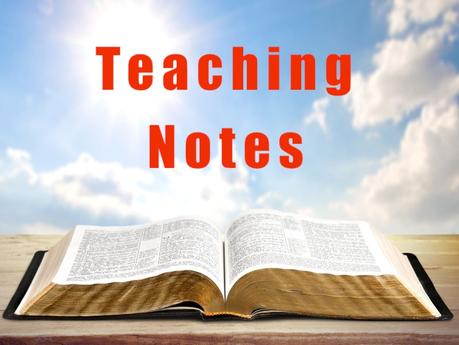Grace Thoughts
Teaching Notes: On Genesis 25

Teaching Notes are Bible studies we taught before GraceLife Ministries began publishing articles online in 1995. Some were presented as sermons, others as group studies.
Our hope is that these older studies will be a blessing to you in your life and ministry. Please use them in any way God leads you.
These teaching notes are from a series of studies about the Book of Genesis.
[These notes are from a study from almost 45 years ago.]
Genesis 25:1-3
Then again Abraham took a wife, and her name was Keturah. And she bare him Zimran, and Jokshan, and Medan, and Midian, and Ishbak, and Shuah. And Jokshan begat Sheba, and Dedan. And the sons of Dedan were Asshurim, and Letushim, and Leummim.
Abraham took another wife – Keturah (qəṭūrāh) and had six sons with her: Zimran (zimrān), Jokshan (yāqəšān), Medan (məḏān), Midian (miḏyān), Ishbak (yišbāq) and Shuah (šūaḥ).
These are thought to be ancestors of various Arab tribes and nations.
Jokshan was the father of Sheba (šəḇā) and Dedan (dəḏān) These are the same names of the children of Raamah, son of Cush, son of Ham, son of Noah.
The descendants of Dedan were the Asshurites (’aššūrim), the Letushites (ləṭūšîm) and the Leummites (lə’ummîm).
Genesis 25:4-11
And the sons of Midian; Ephah, and Epher, and Hanoch, and Abidah, and Eldaah. All these were the children of Keturah. And Abraham gave all that he had unto Isaac. But unto the sons of the concubines, which Abraham had, Abraham gave gifts, and sent them away from Isaac his son, while he yet lived, eastward, unto the east country. And these are the days of the years of Abraham’s life which he lived, an hundred threescore and fifteen years. Then Abraham gave up the ghost, and died in a good old age, an old man, and full of years; and was gathered to his people. And his sons Isaac and Ishmael buried him in the cave of Machpelah, in the field of Ephron the son of Zohar the Hittite, which is before Mamre; The field which Abraham purchased of the sons of Heth: there was Abraham buried, and Sarah his wife. And it came to pass after the death of Abraham, that God blessed his son Isaac; and Isaac dwelt by the well Lahairoi.
The sons of Midian were Ephah (‘êp̄āh), Epher (‘êp̄er), Hanoch (ḥănōḵ), Abida (’ăḇîḏā‘) and Eldaah (’eldā‘āh).
While Abraham was still living, he gave gifts to the sons of his concubines and sent them away to the land of the East (Arabia).
In death, Abraham left everything he had too Isaac.
When Abraham was 175 years, he died. He was buried by Isaac and Ishmael in the cave of Machpelah, where Sarah was buried.
“He was gathered to his people” means that Abraham went to his people who had gone on before him in death.
(Note: Read Hebrews 11:8-16)
God blessed Isaac.
At the time of Abraham’s death, Isaac lived near Beer Lahai Roi (rō’î). It means “well of the Living One that seeth me.” This was the same place that Hagar saw the theophany. The site is in the Negeb between Kadesh and Bered.
Genesis 25:12-16
Now these are the generations of Ishmael, Abraham’s son, whom Hagar the Egyptian, Sarah’s handmaid, bare unto Abraham: And these are the names of the sons of Ishmael, by their names, according to their generations: the firstborn of Ishmael, Nebajoth; and Kedar, and Adbeel, and Mibsam, And Mishma, and Dumah, and Massa, Hadar, and Tema, Jetur, Naphish, and Kedemah: These are the sons of Ishmael, and these are their names, by their towns, and by their castles; twelve princes according to their nations.
At this point, Moses lists the names of the sons of Ishmael. The list is chronological according to birth:
- Nebaioth (nəḇāyōṯ)
- Kedar (qêḏār)
- Adbeel (’aḏbə’êl)
- Mibsam (miḇśām)
- Mishma (mišmā‘)
- Dumah (ḏūmāh)
- Massa (maśśā)
- Hadad (ḥăḏaḏ)
- Tema (ṯêmā)
- Jetur (yəṭūr)
- Naphish (nāp̄îš)
- Kedemah (qêḏəmāh)
These are the names of the twelve tribal rulers according to their settlements and camps.
Genesis 25:17-18
And these are the years of the life of Ishmael, an hundred and thirty and seven years: and he gave up the ghost and died; and was gathered unto his people. And they dwelt from Havilah unto Shur, that is before Egypt, as thou goest toward Assyria: and he died in the presence of all his brethren.
Ishmael lived to be 137 years old, then he died and was gathered to his people.
Ishmael’s descendants settled in the area from Havilah to Shur, near the border of Egypt, as you go toward Asshur. This would be in the area of Saudi Arabia.
These people (Ishmaelites) lived in hostility toward all other people. This is a trait that continues even to this day. They are the desert Bedouin tribes.
Ishmael has a special place in the plan of God because he and his descendants are the children of Abraham through Hagar. I’m certain that I’ll see more of this line in future Bible study.
Genesis 25:19-34
And these are the generations of Isaac, Abraham’s son: Abraham begat Isaac: And Isaac was forty years old when he took Rebekah to wife, the daughter of Bethuel the Syrian of Padanaram, the sister to Laban the Syrian. And Isaac intreated the Lord for his wife, because she was barren: and the Lord was intreated of him, and Rebekah his wife conceived. And the children struggled together within her; and she said, If it be so, why am I thus? And she went to enquire of the Lord. And the Lord said unto her, Two nations are in thy womb, and two manner of people shall be separated from thy bowels; and the one people shall be stronger than the other people; and the elder shall serve the younger. And when her days to be delivered were fulfilled, behold, there were twins in her womb. And the first came out red, all over like an hairy garment; and they called his name Esau. And after that came his brother out, and his hand took hold on Esau’s heel; and his name was called Jacob: and Isaac was threescore years old when she bare them. And the boys grew: and Esau was a cunning hunter, a man of the field; and Jacob was a plain man, dwelling in tents. And Isaac loved Esau, because he did eat of his venison: but Rebekah loved Jacob. And Jacob sod pottage: and Esau came from the field, and he was faint: And Esau said to Jacob, Feed me, I pray thee, with that same red pottage; for I am faint: therefore was his name called Edom. And Jacob said, Sell me this day thy birthright. And Esau said, Behold, I am at the point to die: and what profit shall this birthright do to me? And Jacob said, Swear to me this day; and he sware unto him: and he sold his birthright unto Jacob. Then Jacob gave Esau bread and pottage of lentiles; and he did eat and drink, and rose up, and went his way: thus Esau despised his birthright.
Now we have an account of the line of Isaac. He was forty years old when he married Rebekah. She was Aramean (Syrian). Her father, Bethuel, was from Paddan Aram (also known as Northwest Mesopotamia).
Rebekah was physically barren, so Isaac prayed on her behalf and she became pregnant. Rebekah could sense an unusual stirring in her womb and asked the Lord what it meant and why it was happening to her. The Lord told her that two nations were in her womb and the two peoples from within would be separated. One of the peoples would be stronger, and the older would serve the younger.
The day of birth came and two (twin) boys were born. The first came out and was red and very hairy. Isaac and Rebekah named him Esau (‘êśāw), which means “hairy.” Following right on his heels was the second son grasping the heel of Esau. His parents named him Jacob (ya‘ăqōḇ), which means “he grasps the heel.” It’s figurative definition is “he deceives.”
Isaac was sixty years old when they were born, so he spent twenty years alone with Rebekah.
The boys grew up. Esau became a very skillful hunter, a man of open country. Isaac had a taste for wild game and took more to Esau. Jacob was a quieter man and stayed close to home becoming the favorite of Rebekah.
It’s unfortunate when parents choose favorites. It drives an unnatural wedge between the children and each other.
One day Esau came in from the open country and was quite famished. He saw Jacob making some stew and asked him for some. The stew had a red color and Esau got the name Edom (’ĕ-ḏō-wm), which means “red.” Jacob used this situation to press for the birthright (bəḵōrāṯəḵā). The birthright was the right which naturally belonged to the firstborn son. This birthright consisted of a double portion of what the father had to leave. Esau responded by saying he was about to die and that the birthright was of no use to him. Jacob made him swear by an oath and sell the birthright. Then he gave Esau some bread and lentil stew. Esau ate and drank and left. In effect, Esau despised his birthright.
Hebrews 12:16 says that Esau was a “godless” man, selling his inheritance rights as the oldest son for a single meal.
Next Time
We will look at Genesis Chapter 26 in the next part of our special series.
[Thank you for reading these teaching notes from almost 45 years ago. My prayer is they will be a blessing to you and your life and ministry.]
 AbrahamEsauGenesisIsaacRebekah
AbrahamEsauGenesisIsaacRebekah

Published by gracelifethoughts
Founder & Director of GraceLife Ministries View all posts by gracelifethoughts
